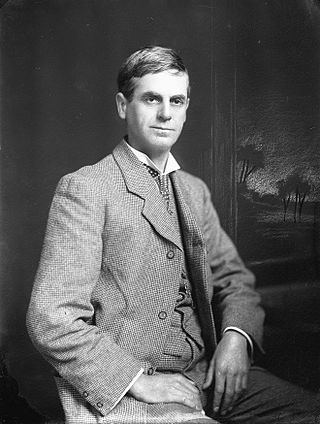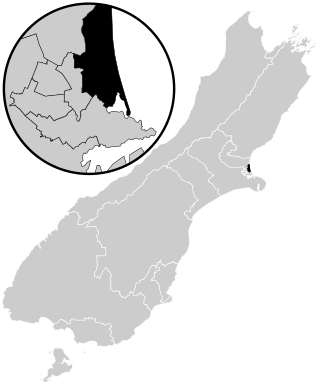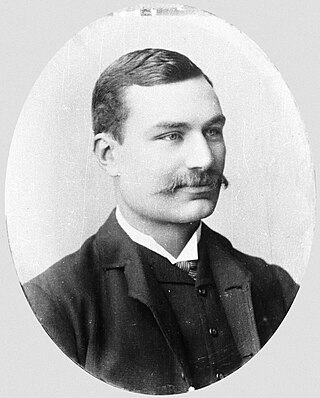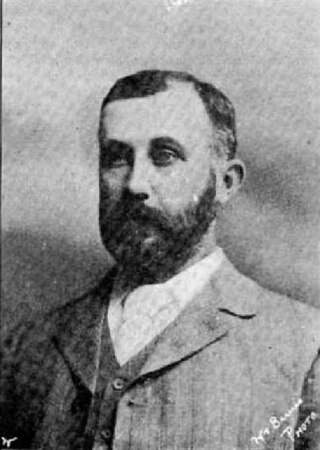Related Research Articles

The 1899 New Zealand general election was held on 6 and 19 December in the European and Māori electorates, respectively, to elect 74 MPs to the 14th session of the New Zealand Parliament. The election was again won by the Liberal Party, and Richard Seddon remained Prime Minister.
City of Auckland was a New Zealand electorate formed for the election of 1853. It covered the core of Auckland during the early days of New Zealand democracy, when the city was small enough to be covered by two or three seats. It existed from 1853 to 1860, and from 1890 to 1905.

Sir Thomas Mason Wilford was a New Zealand politician. He held the seats of Wellington Suburbs then Hutt continuously for thirty years, from 1899 to 1929. Wilford was leader of the New Zealand Liberal Party, and Leader of the Opposition from 1920 to 1925.

Thomas Edward Taylor was a Christchurch mayor, New Zealand Member of Parliament, businessman and prohibitionist.

Christchurch East, originally called Christchurch City East, is a current New Zealand parliamentary electorate. It was first created for the 1871 election and was abolished for two periods, from 1875–1905 and again from 1946–1996. It was last created for the introduction of the MMP voting system for the 1996 election. The current MP is Reuben Davidson, a member of the New Zealand Labour Party who was first elected in the 2023 New Zealand general election.

Nelson is a New Zealand parliamentary electorate, returning one Member of Parliament to the House of Representatives of New Zealand. From 1853 to 1860, the electorate was called Town of Nelson. From 1860 to 1881, it was City of Nelson. The electorate is the only one that has continuously existed since the 1st Parliament in 1853.
Waimarino was a New Zealand parliamentary electorate that existed from 1911 to 1954, and from 1963 to 1972. It was rural in nature and was represented by four Members of Parliament.
Avon is a former New Zealand parliamentary electorate. It was created for the 1861 general election and existed until 1996. It was represented by 13 Members of Parliament and was held by Independents, Liberal Party or Labour Party representatives.

Arthur Edgar Gravenor Rhodes was a New Zealand Member of Parliament and Mayor of Christchurch.
Timaru was a parliamentary electorate, in New Zealand's South Island. It existed continuously from 1861 to 1996 and was represented by eleven Members of Parliament.
Wairau was a parliamentary electorate in the Marlborough Region of New Zealand. It was one of the initial 24 New Zealand electorates and existed from 1853 until its abolition in 1938, when it was succeeded by the Marlborough electorate. The electorate had 13 representatives during its existence. The 1861 election in the Wairau electorate was notable in that a later Premier, Frederick Weld, was unexpectedly and narrowly defeated by William Henry Eyes.

Edmund Harvey Taylor was a Liberal Party Member of Parliament in New Zealand.
Christchurch was a parliamentary electorate in Christchurch, New Zealand. It existed three times. Originally it was the Town of Christchurch from 1853 to 1860. From the 1860–1861 election to the 1871 election, it existed as City of Christchurch. It then existed from the 1875–1876 election until the 1881 election. The last period was from the 1890 election to the 1905 election. Since the 1946 election, a similarly named electorate called Christchurch Central has been in existence.
City of Dunedin, during the first two parliaments called Town of Dunedin, was a parliamentary electorate in Dunedin in Otago, New Zealand. It was one of the original electorates created in 1853 and existed, with two breaks, until 1905. The first break, from 1862 to 1866, was caused by an influx of people through the Otago Gold Rush, when many new electorates were formed in Otago. The second break occurred from 1881 to 1890. It was the only New Zealand electorate that was created as a single-member, two-member and three member electorate.

Charles Lewis was an independent conservative Member of Parliament in New Zealand.

William Cowper Smith was a Liberal Party Member of Parliament in New Zealand.

Ernest Eden George, known as Eden George, was born in New South Wales and came to New Zealand as a young man. He made his career in photography and was active in Auckland and Dunedin, but mainly in Christchurch. Entrepreneurial, combative and confrontational, he entered the political scene. In his early life, he stood at five elections to the New Zealand Parliament, but he came last at every occasion. Surprisingly, he was elected Mayor of Christchurch in 1892 without, unlike all his predecessors, having ever served as a councillor on Christchurch City Council before. He had a most difficult year, was soundly beaten at the next election and told councillors that they "should forget him, as he would forget them". Indeed, in 1906, his was the only photo of all the city's ex mayors that was not on display in the mayor's office.
The City of Christchurch by-election of 1896 was a by-election held on 13 February 1896 during the 12th New Zealand Parliament in the urban seat of the City of Christchurch. The by-election was triggered by the appointment of William Pember Reeves as Agent-General to the United Kingdom. The Liberal Government led by Richard Seddon had trouble finding a suitable candidate and delayed Reeves' resignation until the day he left his home in Christchurch to take up the London post. Nonetheless, rumours of Reeves' pending resignation had been circulating for a month and candidates were lining up. The Liberal Party candidate who was secured resigned within a week of Reeves' eventual resignation, and a new candidate had to be found. Three candidates contested the election: Richard Molesworth Taylor was the official Liberal Party candidate, Tommy Taylor was a prohibitionist also with liberal views but an ardent opponent of Seddon, and Charles Lewis was the reluctant conservative candidate of the opposition. Being a Liberal Party stronghold, vote splitting between those candidates who held liberal views secured the election win for Lewis, with the Liberal Party candidate coming last.

The Christchurch mayoral election held on 30 November 1881 was contested by German-born baker, hotel proprietor and businessman George Ruddenklau, and businessman Charles Taylor. The election was won by Ruddenklau with a small margin.
References
- Scholefield, Guy (1950) [First published in 1913]. New Zealand Parliamentary Record, 1840–1949 (3rd ed.). Wellington: Govt. Printer.
- Wilson, James Oakley (1985) [First ed. published 1913]. New Zealand Parliamentary Record, 1840–1984 (4th ed.). Wellington: V.R. Ward, Govt. Printer. OCLC 154283103.